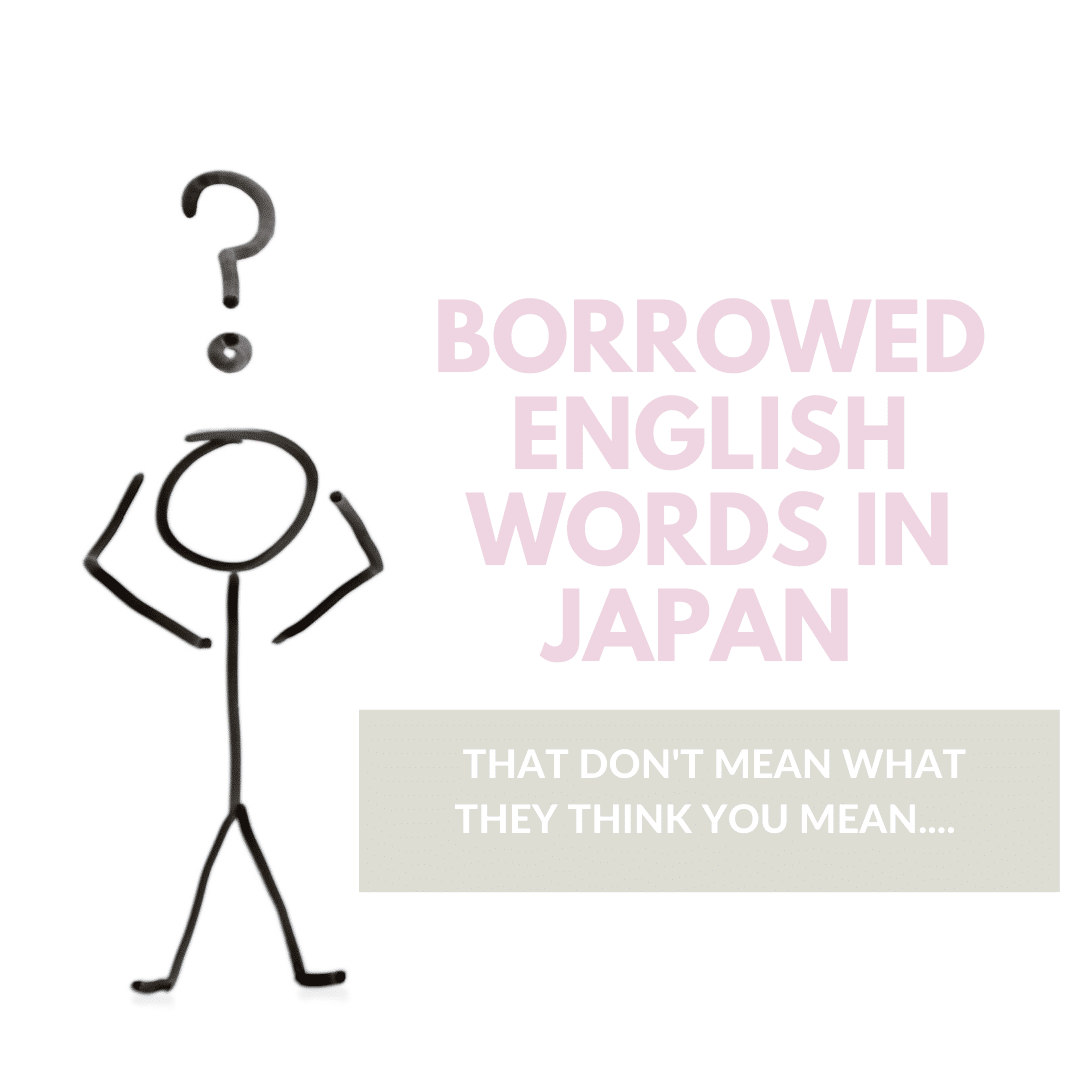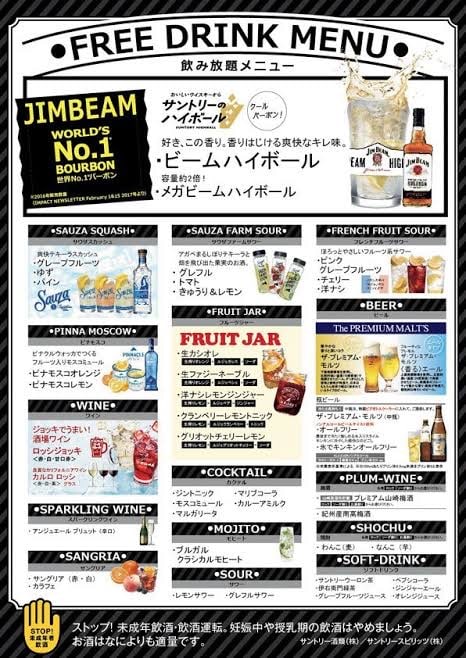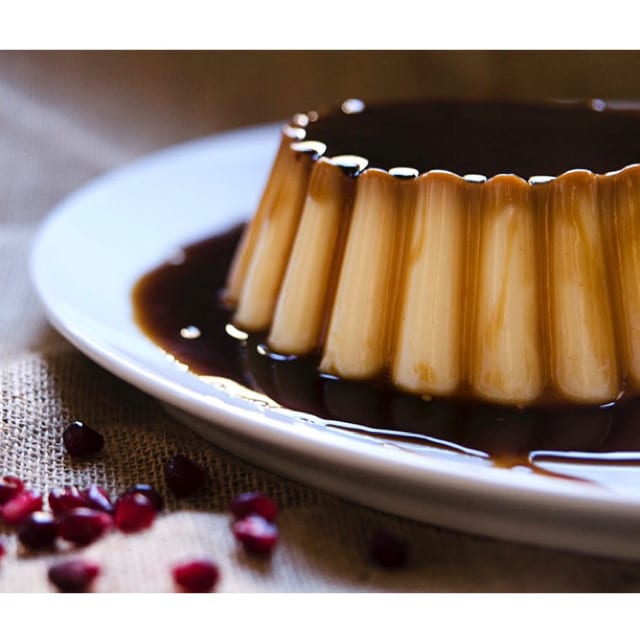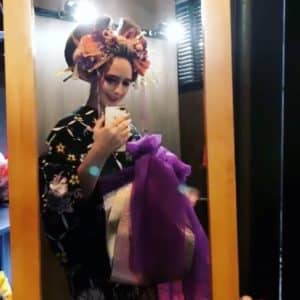
Now… when I say “borrowed words” in this instance I’m not referring to katakana words (such as orange juice becoming orenji jyu-su) I’m referring to an English word that is used in Japan but takes on a new meaning – which I found to be quite a mind shift .
The trickiest part is these words are seen as borrowed words and many Japanese people think they are used this way in English. So let me give you a head start on the options I struggled with at first…
(If you know even more … please let me know!)
Please note that, as confusing as they may be, I don’t consider these words to be an incorrect use of English words. These are words that have been adopted and have transformed and have now become a piece of the Japanese language. If you are feeling frustrated by these words you might find that you are experiencing some feelings of culture shock ( I know, because I’ve been there) and you might enjoy my article on my experiences with culture shock here.
BORROWED ENGLISH WORDS OR JAPANESE VERSION OF ENGLISH WORDS THAT DON’T MEAN WHAT YOU THINK THEY MEAN…
“Free drink”
Sounds nice, right?
Well, I hate to burst your drinkie dream bubbles but if this is on the menu it almost always refers to “all-you-can-drink” aka nomihoudai menu options on a menu ( as in, you pay a set rate for a bottomless drinks for a set amount of time.)
It’s still usually a good deal but …alas.. not “free.”
If you want to read more about nomihoudai options in Japan, take a look at my post here on Quick Tips for Travelling in Japan.
Here is an example:

“My Pace”
I heard this phrase occasionally when working for larger companies or when in big groups of people. With Japanese intonation, the phrase sounds more like “mai pe-su” and I’ve heard it used to describe someone who marches to the beat of their own drum ( in my experience it does not seem to relate to the slow or fast pace at which someone works or behaves it’s more about someone who doesn’t seem fussed if the rest of the group is doing something different or in a different manner.) I honestly don’t think I’ve ever heard it used in a negative way and, in fact, more as an endearing ( maybe sometimes slightly condescending ? But ..then again… depends on the context…)
The most amusing / confusing part of adjusting to the term “my pace” for me, in Japan, is that, when used, the “my” pronoun doesn’t change.
So instead of saying “Jo is at her own pace” or ” Jo runs at Jo’s pace” it would literally be said as ” Jo is my pace.”
“Mansion”
Proudly can I now say that I’ve lived in several “mansions” thanks to Japan’s version of the phrase. I was hoping I’d be referring to more of an Oliver Warbucks type deal but … no… in Japan a “mansion” (manshon) is an apartment block with centralized postboxes, elevator and stair access and almost always a communal entrance. So don’t be too confused when you hear people speaking about their “one-room mansion” (they aren’t being modest, their live in a small one room apartment) or a 高級マンション ( a koukyu mansion) is a high-end/ more luxurious apartment or condo.
“Fight!”
Okay so this is not a huge stretch of the imagination to switch between meanings but, I can tell you that if I heard FIGHT! in the schoolyard in Australia it meant you could catch a glimpse of students slapping and punching one another.
I don’t hear it so often in Japan but that’s probably because I’m way past student age but FIGHT! (faito!) is used in a “go get ’em” kind of way – in more of a cheerleader “go, fight, win!” type vibe.
“One piece”
One piece to me equals “one piece of cake” or “a one-piece swimsuit” ( maybe ? ) but in Japan “one piece” (wanpi-su) is referring to a dress. Don’t get cocky though as describing a two piece outfit doesn’t seem to translate at all.
“En-Jee”
I know it’s weird to write it as “en-jee” but that’s how I heard it for the first time and actually was looking it up in my Japanese-English dictionary. The word pronounced “en-jee” is referring to “NG” – which stands for no good. Some of my international friends clocked onto this before me but the term “NG” certainly hasn’t ever appeared in my natural life before so I was confused.
NG in fashion magazines might be written next to the badly accessorized outfit, for example ( with a “tick” symbol expressing the opposite meaning.)
“High Touch”
You’ll probably only come across this if you have or work with children but “high touch” (hai tachu) means “high 5″ or ” give me five”
“Pasokon”
When I worked in my first Japanese office I had enough Japanese to just get by but on the first day I was vaguely directed to my office spot and told to go to my “pasokon”. “Pasokon?” I repeated back and my co-worker looked at me like I left my brain at home and just said it again more slowly ” pa-so-kon”
Later in the day I worked out that “pasokon” is a shortened version of “personal computer” ( as in a desktop computer) and was so widely used in Japan that my colleagues thought it was actually an English word.
“High Tension”
If someone ever referred to me as “high tension” in English I’d assume that maybe they meant I was stressed or anxious (ie. “full of tension” perhaps?)
But in Japan if someone refers to you as having “high tension” is usually means “you’re vibing” “you’re ‘full of beans’!” “you’re really feeling it ( like.. feeling the music ) “well, you’re excited (this morning)”
Another variation is tension ga takai which also means the same thing (takai means “high”)
And the opposite is tension ga hikui which means “you seem down” “you aren’t feeling it/yourself (today)” – sometimes I hear people say “low tension” but not that often.
“Snack”
Although many Japanese people understand that the word “snack” in English refers to food between meals the word “Oyatsu” is used more commonly.
But if you’ve just started learning katakana, you might be confused as to why you see so many neon signs in Japan that say スナック ( Snack.). A snack ( sunakku) bar is a name of a small bar. It usually is quite intimate and can sometimes only seat a handful of patrons at a time. Many patrons are regulars and will sit and drink and chat to themselves and to the owner who is tending to the bar. Snack bars often come with a cover charge (varies in price depending on the area/ establishment rules etc.) They sometimes have karaoke or a tv playing free to air shows in the corner.
“Biniiru”
Sometimes said as “biniiru” and sometimes “biniiru bukuro” – this is referring to a plastic bag. Apparently it comes from the word “vinyl” but make sure you pronounce it the Japanese way that sounds like “bin-ear-ru” or all meaning will be lost. Rather than using, it is a good word to learn to audibly recognize as some shops may ask if you’re like a “biniiru bukuro” – ie. a plastic bag.
“Salaryman”
I giggle to myself as I will now and forevermore always hear “celeryman” when I hear people use this term. The term “salaryman” wasn’t that hard to decipher – it means someone who works a day job in an office. I mainly heard this when I caught up with a Japanese girlfriend who had a new love interest or was married and described their husband as a “salaryman.” I hope this term dies out much quicker than it seems to be. It’s boring, gross and sexist.
I also always feel a bit icky about the weird secrecy it seems to link to for me ( I don’t think Japanese people see it that way. ). I think its just a cultural thing for me.
I have been in Japan long enough to know that’s not the case, it does still sound to me like they just don’t want to give away any secret details. However, in reality I know that it is described this way for a few reasons – one being that it is being modest as it doesn’t give away one’s rank in a company ( it also “protects” that person from embarrassment if they aren’t very senior) but another reason is because many Japanese companies don’t have employees who still to one job title because that’s what they studied.
For example, in Australia, where I’m from, if you’d studied to be an accountant then you’d most likely be an accountant within your organization. Then, at a dinner party, if someone asked you what you did, you would say “I’m an accountant.” And then, if that person wanted to move to HR or Marketing or something they would need to be trained up ( most likely externally) before taking on that new job role. Whereas in Japan, it is common for companies to almost make a “family-style” approach to job roles and employees can move between departments depending on their skill-sets, sometimes wishes, and the company requirements.
So that was a long winded description but… basically “salaryman” refers to “man in a suit who works for a company in an office.”
“OL” / “Oh-eru”
OL ( pronounced oh-eru) is , or at least to be the female version of a salaryman. OL stands for Office Lady. For many of the reasons specified by me in the paragraph above I find this term to be very problematic and… just on person principle.. yeah… this word isn’t coming out of this mouth. Describing yourself as an “office lady”? Seriously. ‘Nuff said.
“Jimu”
Okay.. I need to share my own embarrassing story here. In my early 20s, I was out at karaoke in Osaka with a giant group of friends. One of the girls was in a small group of us walking to a station at the end and in a lovely quiet lull in conversation I asked her what she did for work. She responded that she did “jimu” work. To which I responded “Oh that’s why you are so fit and healthy!” and everyone was suddenly dead silent.
It’s not until a few minutes later, to everyone’s delight, I thought that “jimu“meant “gym” … as in… she worked in a sports club…
Nope. Not what she meant at all.
The “jimu” (事務)she was referring to means “administrative or office work.”
So .. yes… let my story save you the embarrassment in the same manner.
“Purin'”
I only really know this affectionate term because I do dye my hair.
Creme Caramels are very popular in Japan ( and cheap delicious options are sold in convenience stores – recommend!) and are called “purin” as in “pudding” with a Japanese accent. So don’t be confused because it doesn’t mean a heavy Christmas pudding-style pudding. Also, for British friends, it also doesn’t refer to an after dinner dessert. It seems to only refer to creme caramels. HOWEVER, it is also a way to refer to your own or someone’s else’s head with lots of dark regrowth between salon appointments. So the dark regrowth is the dark sauce and the blonder leftovers being the wobbly custardy section.

“KY”
Don’t let your brain go straight to KY jelly ( like mine does) this refers to one of my favourite Japanese notions. KY stands for two Japanese words. Kouki Yomenai.
Kouki means “the air” or “the atmosphere.”
Yomenai means “can’t read.”
This phrase refers to someone who can’t read the room. Someone who fails to pick up on the general vibe in, mostly, a serious or sad setting.
“Doctor Stop”
This is something I heard a lot while working in a corporate setting. “Where is so-and-so coworker today?” “Oh they are “Doctor Stop.”
I was, understandably, confused.
It means that someone is under Doctor’s orders to slow down/ take it easy.
“Hamburg” (Hanba-gu)
Most friends who have lived in Japan have had the experience of thinking they had ordered a hamburger when just the patty arrived (with other sides next to it but no bread) at their table. I understand that “Hanba-gu” in Japan refers to a meat patty ( often marinated in a demi-glace sauce and the meat is often fantastic quality – I’ve yet to meet someone who didn’t like it a lot.). I understand that for some nationalities it is similar to a hamburger steak. But where I’m from in Australia, I think it would be best to describe hanba-gu as a very fancy hamburger patty or a good quality rissole.
You’ll often find hanba-gu on the menu at a set menu at lunch time or at a diner or hot-plate restaurant. Controversial opinion? I think hanba-gu is way better with rice than on bread.
So .. repeat after me: hanba-gu = hamburger patty. hanba-ga– = a hamburger.
“Petto botoru” / “Pet bottle”
The PET in PET bottles in Japan stands for polyethylene terephthalate, a form of polyester that is then moulded to create plastic bottles. So when a rubbish bin or a recycling instruction label specifies PET bottles? That means the empty soft drink plastic bottle.



